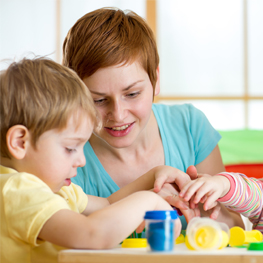
With two tots at home, I’m not immune to the academic anxiety that many parents share. Would my kids head off to Kindergarten with a firm grounding? And, would they do well once they were there? So I paid close attention when my sister-in-law Rebecca started looking at schools for my three-year-old niece, Jillian. I watched as they toured topnotch Montessori schools, private preschools and charter schools. Nothing clicked.
Their chosen school was none of the above. Instead, they opted to preschool Jillian at home, riding a wave of interest in home schooling that has trickled down to the pre-Kindergarten set. They’re not alone. The home preschool movement has grown from a few interested parents to legions of families forming home preschool groups and connecting in person and online.
Can children really prepare for Kindergarten and learn social skills without setting foot in a traditional preschool? According to Susan Lemons, author of Home Preschool and Beyond: A Comprehensive Guide to Early Home Education, the answer is a resounding, “Yes.”
“The goals of preschool are to lay down a simple base of knowledge about the world, grow the attention span and learn vocabulary,” she says. Additionally, preschoolers need plenty of time for creative play, art and exploration - all things parents can easily provide.
Ready, set, grow
For some families, home preschool is a temporary stopover on the route to traditional school. For others, the preschool years present a perfect opportunity to dip a toe into the home school waters. While some organization and guidance is helpful, experts warn against leaning too heavily on a structured curriculum. Karen L. Peterson, Ph.D., says preschool educators - including parents - can over-emphasize learning metrics, like counting and reading.
She says preschool activities should focus less on skills like addition or memorizing the names of provinces, and more on general concepts like numerical order and the relationships between people and places. “The goal for preschool should be exposure to concepts, not proficiency,” says Peterson.
Amy Prestia let her son’s interests guide his preschool learning. “Preschoolers are naturally curious about the world. What better time to let them follow their current passion, whether it’s bugs or ships?”
For Karen Crisalli Winter, that means studying botany on meandering walks with three-year-old Tera. Preschoolers are natural scientists, she says. “She’ll point out sword ferns and stinging nettles. We examine the different shapes and colors in nature.”
Play to learn
Home-based academics aren’t hampered by classroom management, so lessons typically take less time than in a room full of energetic kids. This opens up the day for preschoolers’ most important task: play. For preschoolers, play is more important than academic subjects like reading or math. “Play is the cornerstone of preschool,” says Peterson. “It’s the primary way that children under seven process information.”
“Kids retain what they learn if they’re having fun,” says Tara Ruf. Piper, four, learned about colors, insects and the miracle of life by reading Eric Carle’s The Very Hungry Caterpillar and creating tissue-paper butterflies.
Emily Johnston introduced four-year-old Colby and two-year-old Parker to marine biology with a trip to the aquarium. Counting and cooking skills were introduced via a baking session and a trip to a bakery. Adventures with toy trains provided lessons about travel and geography.
Social creatures
Play nurtures the social growth essential for preschoolers. A study published in Mathematics Teaching suggests social and emotional development pave the way for all other learning, and that social competence is predictive of future academic success.
According to Peterson, an important social milestone for preschool-age children is the development of positive ‘entry behaviors’: the ability to effectively approach and join a group of peers. Home schoolers can provide opportunities for their children to practice social skills like these at playgroups, storytimes and other social activities.
Classes are popular for the preschool set, but they don’t always provide a well-rounded social experience. “Motor-skills classes like gymnastics and swimming often focus on the development of individual skills instead of social skills,” says Peterson. She recommends semi-organized settings like library storytimes and small group activities with other parents and children to help develop essential skills like communication and cooperation.
A happier home
Kids aren’t the only beneficiaries of home-based preschool. My sister-in-law Rebecca credits home preschool with improving family harmony. “Jillian gets the one-on-one attention that she needs, and I get to see her thrive,” she says. “It’s brought more happiness to our home.”
Freelance writer Malia was home-schooled in the late ’80s and early ’90s.
Calgary’s Child Magazine © 2024 Calgary’s Child